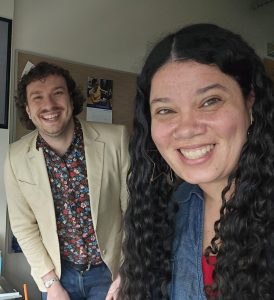 Syracuse University Assistant Professor Dr. Beth Patin and Ph.D. Candidate Tyler Youngman couldn’t believe it when they won the Association for Library and Information Science Education (ALISE) Best Conference Paper last year for the second time, making them the first back-to-back winners in that category in history. Now, they have won the prestigious award for the third time – a rare feat in research, especially by the same authors.
Syracuse University Assistant Professor Dr. Beth Patin and Ph.D. Candidate Tyler Youngman couldn’t believe it when they won the Association for Library and Information Science Education (ALISE) Best Conference Paper last year for the second time, making them the first back-to-back winners in that category in history. Now, they have won the prestigious award for the third time – a rare feat in research, especially by the same authors.
“Earning three consecutive best paper awards is an unprecedented recognition,” Youngman said. “For it to come from the intellectual home for LIS, however, is an even more extraordinary feeling. It is an honor to be celebrated this early in my career by our colleagues in LIS education and research who I so deeply admire, and whose contributions have impacted my own teaching approaches and scholarly inquiry.”
For Patin, the three-peat has felt surreal.
“Tyler and I joked a lot about winning a ‘turkey’ or being a dynasty, like the Chicago Bulls in the 1990s,” she said. “And, while we didn’t anticipate winning, every once in a while you finish a paper and you know a little magic was created, and we definitely had one of those moments.”
Patin and Youngman won for their paper, “Fallacy as Foundation of Post-Truth Knowledge and Knowing in LIS,” which will be available this fall. The paper explores how libraries and information professionals can better support critical thinking and ethics in the face of misleading information.
They decided to focus on the topic of knowledge after seeing how fallacies play a big role in how people understand or misunderstand the world, especially with the growing use of AI tools, the spread of misinformation and a drop in public trust in institutions.
Patin and Youngman started by examining two key types of fallacies: deceptively bad arguments and false popular beliefs. Those fallacies help explain how misinformation can spread and become entrenched. By connecting those concepts with information and knowledge, they showed how fallacies can lead to harmful or misleading views.
The duo’s findings have important implications for library and information science education, especially concerning information literacy, the use of AI tools, and rebuilding trust in information through careful attention and commitment to fairness.
Patin credits her and Youngman’s years of working together, which began when he was a senior in college and continued when he became her Wilhelm scholar research assistant during his master’s program.
“I’m lucky to be his advisor, which has given us so much time to understand how the other thinks and writes,” Patin said. “Another reason for our success is our capacity to leave space for each other’s feedback to make our ideas sharper or concepts more robust. Removing the pressure to write ‘perfectly’ and empowering us to share half-baked ideas, has made an enormous difference.”
“Finally, we are both big thinkers who ask a lot of questions,” she added. “At the end of a paper, while we might have answered the research question we started with, it’s guaranteed we have several more by the time we are finished with our paper. And these new questions often become fodder for the next paper.”
Youngman is thankful that he has been able to learn from Patin’s scholarly guidance and teaching wisdom as an undergraduate, graduate and doctoral student over the past five years.
“For me, this award is a testament to her mentorship and our shared growth from advisor-advisee to colleagues,” he said. “We’re constantly coming up with paper topics and research ideas, and for me to have the freedom, trust, and support to pursue that work has been a significant highlight of my academic upbringing. This award affirms the quality of our work and has instilled in me a great sense of optimism for my emerging research agenda.”
As Patin and Youngman await the theme for next year’s conference, they already have several ideas they want to explore and are excited to try to win again next year.
